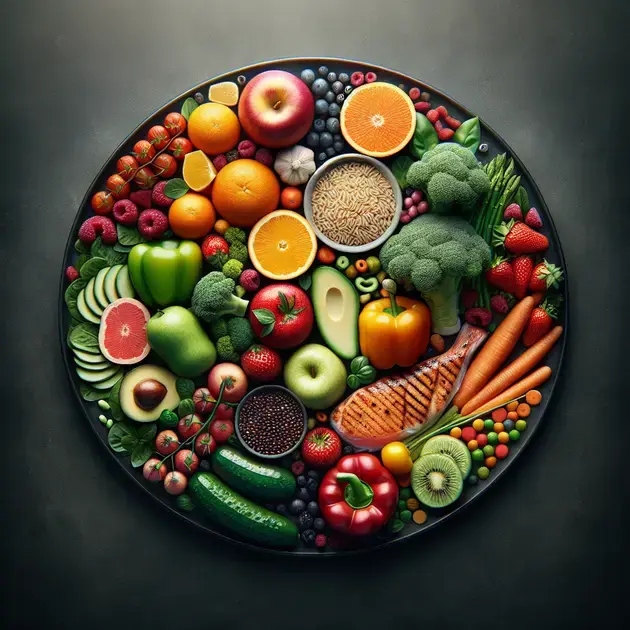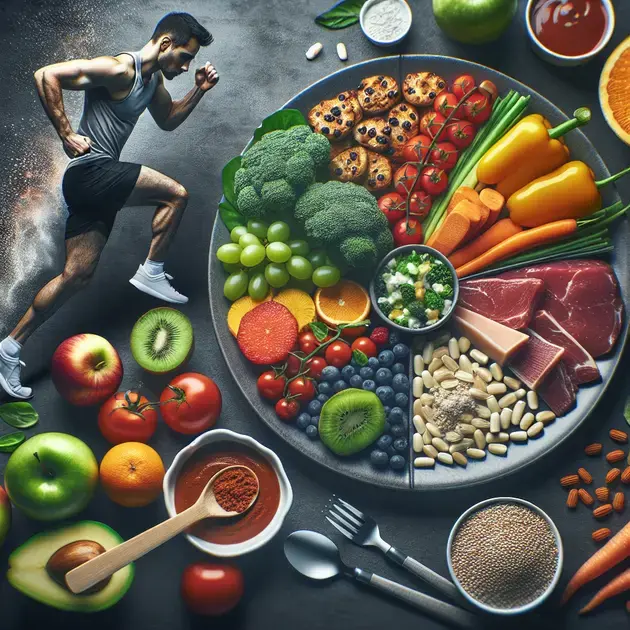Are you looking to “Discover the Effective A Weight Loss Diet Plan for a Healthier You”? With so many diet plans available, it can be overwhelming to find one that not only helps you lose weight but also promotes overall health and well-being.
In today’s fast-paced world, it’s more important than ever to choose a weight loss diet plan that is sustainable and focuses on nourishing your body with the right nutrients. Let’s explore some key strategies for achieving your weight loss goals while improving your health along the way.

Achieve Your Weight Loss Goals with a Balanced Diet
Eating a balanced diet is fundamental to achieving your weight loss goals. One key aspect of a balanced diet is ensuring you are consuming the right amount of nutrients. This includes a mix of macronutrients (carbohydrates, proteins, and fats) and micronutrients (vitamins and minerals). One helpful tool to track your nutrient intake is the MyFitnessPal app. MyFitnessPal allows you to log your meals and snacks, providing a breakdown of the nutrients you are consuming. By regularly monitoring your intake, you can make adjustments to ensure you are meeting your nutritional needs for weight loss.
In addition to nutrient tracking, meal planning plays a crucial role in maintaining a balanced diet. Websites like Eat This Much offer personalized meal plans based on your dietary preferences and weight loss goals. By following a structured meal plan, you can ensure you are getting the right mix of nutrients to support your weight loss journey. Planning ahead also helps prevent impulsive food choices, making it easier to stick to your dietary goals.
Another important aspect of a balanced diet is hydration. Staying well-hydrated is essential for overall health and can support weight loss efforts. Apps like Plant Nanny help you track your daily water intake by gamifying the process. By setting hydration goals and receiving reminders to drink water, you can stay on top of your hydration needs and support your weight loss goals.
Furthermore, incorporating a variety of whole foods into your diet is key to achieving balanced nutrition. Websites like the USDA’s ChooseMyPlate provide guidance on building a healthy plate with the right mix of fruits, vegetables, protein, grains, and dairy. By following these guidelines and diversifying your food choices, you can ensure you are nourishing your body with the nutrients it needs to thrive and support your weight loss efforts.
In summary, achieving your weight loss goals with a balanced diet requires attention to nutrient intake, meal planning, hydration, and food variety. By utilizing tools like MyFitnessPal, Eat This Much, Plant Nanny, and ChooseMyPlate, you can create a sustainable approach to eating that supports your long-term success in reaching a healthier weight.
The Importance of Nutrient-Rich Foods in Your Weight Loss Journey
Consuming nutrient-rich foods is crucial for supporting your weight loss journey. These foods provide essential vitamins, minerals, and antioxidants that nourish your body and support overall health. One way to identify nutrient-rich foods is by using the FoodData Central website, which offers detailed nutritional information for a wide range of foods. By prioritizing nutrient-dense options like fruits, vegetables, lean proteins, and whole grains, you can fuel your body with the nutrients it needs to thrive.
In addition to nutrient density, considering the quality of your food choices is important for weight loss success. The Clean Eating app offers recipes and meal ideas focused on whole, unprocessed foods. By choosing minimally processed foods and cooking at home more often, you can avoid hidden sugars, unhealthy fats, and excess calories commonly found in processed foods.
Furthermore, mindful eating practices can enhance the benefits of nutrient-rich foods in your weight loss journey. Apps like Headspace offer guided meditations and mindfulness exercises to help you develop a healthier relationship with food. By practicing mindful eating, you can increase awareness of hunger cues, savor your meals, and make conscious choices that support your weight loss goals.
Another key aspect of incorporating nutrient-rich foods is meal prepping. The Mealime app provides personalized meal plans and recipes that focus on whole, nutrient-rich ingredients. By dedicating time to prepare meals in advance, you can ensure you have healthy options readily available, making it easier to make nutritious choices and avoid impulsive eating that may derail your weight loss progress.
In conclusion, prioritizing nutrient-rich foods in your diet is essential for supporting your weight loss journey. By utilizing resources like FoodData Central, the Clean Eating app, Headspace, and Mealime, you can enhance the nutritional quality of your meals, develop mindful eating habits, and set yourself up for long-term success in achieving a healthier weight.
Long-Term Success: Sustainable Strategies for a Healthier You
Long-term success in weight loss requires sustainable strategies that prioritize both physical and mental well-being. One approach to sustainable weight loss is setting realistic goals that focus on gradual progress rather than quick fixes. The Noom app utilizes a behavior change approach to help you set achievable goals, track your progress, and develop healthy habits that support long-term weight management.
In addition to goal setting, establishing a support system can significantly impact your success in maintaining a healthy weight. Websites like SparkPeople offer a community forum where you can connect with others on similar weight loss journeys, share experiences, and receive support and motivation. By surrounding yourself with a supportive network, you can stay accountable, share insights, and navigate challenges more effectively.
Moreover, incorporating regular physical activity into your routine is essential for sustaining weight loss. The MyPlate app provides personalized workout plans and activity tracking to help you stay active and monitor your progress. By finding activities you enjoy and scheduling them into your week, you can make exercise a consistent part of your lifestyle and support your long-term health goals.
Another key aspect of long-term success is practicing self-care and stress management. The Calm app offers guided meditations, sleep stories, and relaxation techniques to help you reduce stress and improve sleep quality. By prioritizing self-care practices, you can enhance your overall well-being, reduce emotional eating triggers, and cultivate resilience in the face of setbacks on your weight loss journey.
In conclusion, sustainable strategies for a healthier you involve setting realistic goals, building a support system, staying active, and prioritizing self-care. By utilizing tools like Noom, SparkPeople, MyPlate, and Calm, you can create a holistic approach to weight management that focuses on long-term health and well-being.

Effective Strategies for Implementing a Healthy Eating Plan
When it comes to implementing a healthy eating plan, there are several effective strategies that can help you achieve your wellness goals. One key strategy is to focus on whole, nutrient-dense foods such as fruits, vegetables, lean proteins, and whole grains. These foods provide essential vitamins, minerals, and antioxidants that support overall health and well-being.
Another important aspect of a healthy eating plan is portion control. Paying attention to serving sizes and listening to your body’s hunger cues can help prevent overeating and support weight management. Additionally, staying hydrated by drinking plenty of water throughout the day is crucial for optimizing digestion and overall bodily functions.
Meal planning and preparation are also essential components of a successful healthy eating plan. By planning your meals ahead of time and preparing nutritious snacks, you can avoid unhealthy food choices and stay on track with your dietary goals. Incorporating a variety of foods and flavors into your meals can help prevent boredom and ensure you are getting a wide range of nutrients.
Regularly monitoring your progress and making adjustments as needed is key to sustaining a healthy eating plan long-term. Keep a food journal, track your meals, and reassess your goals periodically to ensure you are on the right track. Remember, consistency is key, and small, sustainable changes over time can lead to significant improvements in your overall health and wellness.
The Role of Physical Activity in Your Weight Management Journey
Physical activity plays a crucial role in any weight management journey. Incorporating regular exercise into your routine can help increase your metabolism, burn calories, and build lean muscle mass. Whether it’s cardio, strength training, yoga, or any other form of physical activity, staying active is essential for maintaining a healthy weight.
In addition to its impact on weight management, physical activity offers a wide range of benefits for overall health. It can help reduce the risk of chronic diseases, improve cardiovascular health, boost mood and mental well-being, and enhance quality of life. Aim to engage in at least 150 minutes of moderate-intensity exercise per week for optimal health benefits.
Finding activities that you enjoy and that fit your lifestyle is key to staying motivated and consistent with your exercise routine. Whether it’s going for a walk, joining a group fitness class, or playing a sport, the important thing is to move your body regularly and make physical activity a priority in your daily life.
Remember that physical activity is not just about burning calories; it’s also about building strength, endurance, and flexibility. Mix up your workouts, set new goals, and challenge yourself to try new activities to keep things exciting and prevent boredom. Stay committed to your fitness journey, and you’ll not only manage your weight more effectively but also experience numerous health benefits along the way.
Balancing Macros: Understanding the Key Components of a Successful Diet
When it comes to maintaining a healthy diet, understanding the balance of macronutrients—carbohydrates, proteins, and fats—is crucial. Each macronutrient plays a unique role in the body and contributes to overall health and well-being. Balancing macros involves consuming the right proportions of each nutrient to support your individual dietary needs and goals.
Carbohydrates are the body’s primary source of energy and should make up a significant portion of your daily caloric intake. Focus on complex carbohydrates such as whole grains, fruits, and vegetables, which provide fiber, vitamins, and minerals in addition to energy. Be mindful of portion sizes and opt for whole, unprocessed foods whenever possible.
Proteins are essential for muscle growth, repair, and overall cellular function. Including lean sources of protein such as poultry, fish, tofu, and legumes in your diet can help you feel full and satisfied while supporting your body’s protein requirements. Aim to distribute your protein intake evenly throughout the day to optimize muscle synthesis.
Fats are another important macronutrient that plays a role in hormone production, brain function, and nutrient absorption. Healthy fats found in foods like avocados, nuts, seeds, and olive oil are beneficial for heart health and overall well-being. While fat is calorie-dense, incorporating moderate amounts of healthy fats into your diet can enhance flavor and satisfaction in your meals.
By understanding the key components of a successful diet and finding the right balance of macronutrients for your individual needs, you can support your health, energy levels, and overall well-being. Remember that consistency and moderation are key, and consult with a healthcare professional or nutritionist for personalized guidance on optimizing your macronutrient intake.
Conclusion
In conclusion, implementing a healthy eating plan involves focusing on nutrient-dense foods, practicing portion control, and staying hydrated. Meal planning, preparation, and variety are essential for long-term success. Regular monitoring and adjustments are key to sustaining a healthy diet and achieving wellness goals.
Physical activity is crucial for weight management, offering benefits beyond just calorie burning. Engaging in various exercises, finding activities you enjoy, and staying consistent are vital for overall health and well-being. Building strength, endurance, and flexibility through workouts further enhance the weight management journey.
Balancing macronutrients—carbohydrates, proteins, and fats—is essential for a successful diet. Understanding the role of each nutrient, emphasizing whole foods, and distributing protein intake are critical for supporting individual dietary needs. Incorporating healthy fats in moderation contributes to heart health and overall well-being.